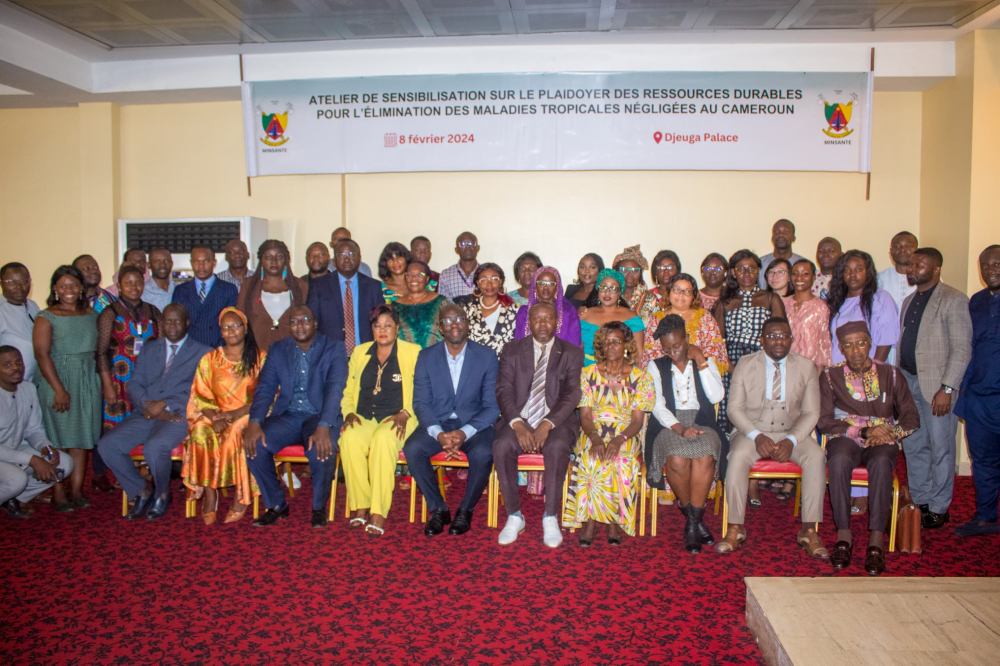Eliminating Neglected Tropical Diseases : Sourcing Sustainable Local Resources To Pursue Fight
- Par Kimeng Hilton
- 09 févr. 2024 13:24
- 0 Likes

The Ministry of Public Health organized a one-day workshop in Yaounde on February 8, 2024 to raise awareness on the issue.
Over the years, Cameroon has relied heavily on foreign resources to tackle Neglected Tropical Diseases, NTDs. However, the funding has been dwindling with time. Thus the urgency to seek alternative resources - especially locally – to continue to fight NTDs. It was for this reason that the Ministry of Public Health on Thursday, February 8, 2024 organized a workshop in Yaounde. On the topic, “Sensitization Workshop on Advocacy for Sustainable Resources for The Elimination of Neglected Tropical Diseases in Cameroon.”
Inadequate Financing
Dr Georges Nko’Ayissi, the Coordinator of the Fight Against Neglected Tropical Diseases in the Ministry of Public Health explained that the workshop sought to bring in other stakeholders in the fight against NTDs. “We realized that the only source of financing for the fight against NTDs for the Ministry of Public Health was not enough to eliminate these diseases. There are aspects about these diseases that require the support of other stakeholders to eliminate them,” Dr Nko’Ayissi said.
Poverty, Water, Sanitation As Causes
“Neglected Tropical Diseases are prevalent in poor communities, are infectious and cause disability and stigmatization. For countries looking forward to emergence, NTDs must be eliminated. This is why the international community fixed 2030 to eliminate NTDs,” Dr Nko’Ayissi recalled. According to him, the Ministry of Public Health is already doing much to contain NTDs like mass drug distribution, screening and treatment. To eliminate the diseases, hygiene and sanitation, and access to water need to be improved because most NTDs are caused by the lack of access to good drinking water. As a result, it is difficult to eliminate the diseases without handling their causes. Thus, there is need for more education, sensitization.
Local Ownership
“The Ministry of Public Health wants to bring on board other sectors to collaborate in efforts to eliminate NTDs. The other thing we mentioned in the workshop was the capacity of local councils to take ownership of the fight against NTDs. We cannot continue to count on foreign donors, who are gradually pulling out, to distribute medication. We therefore want to mobilize local resources. It is not all about money, but skills, especially from the decentralization process,” Dr Nko’Ayissi noted.
Decentralised Local Governments
“The fight against NTDs can be better organized by decentralized local governments. Local councils better understand the problems of water and where to construct water points. NTDs continue to thrive also because household waste is not properly managed. The more efforts on eliminating NTDs are taken as closely to the people as possible, the better. Thus, the workshop sought to mobilize all stakeholders to join in efforts to eliminate NTDs in Cameroon,” Dr Georges Nko’Ayissi underscored.
He clarified that the workshop did not seek to raise funds for the elimination of NTDs. Rather, it was to sensitise on what councils can do to contribute to the elimination of NTDs. Health efforts alone cannot eliminate NTDs. Everyone must come on board, Dr Nko’Ayissi emphasized.
The Role Of CVUC
Mrs. Fadimatou Halaka of Communes et Villes Unies du Cameroun, CVUC association said councils and city councils can contribute to the fight against Neglected Tropical Diseases by sensitizing the public. “CVUC, which is made up of the 374 councils in Cameroon, can encourage councils and city councils to invest more in health by using devolved resources from the decentralization programme under the 2019 Law. Councils can also assist in the mass distribution of medication by offering sites for the activity and facilitating administrative procedures,” Fadimatou pointed out.
AIMF, Camwater Partnerships
“Since 2023, CVUC entered a partnership with the International Association of French Mayors, AIMF on water and sanitation. We are about to create a forum to discuss with stakeholders in order to tackle challenges of water and sanitation, waste management…. CVUC is also discussing with Camwater to offer technical assistance to councils on getting good drinking water. Camwater has signed special contracts with some councils to treat and distribute water,” Mrs. Halaka disclosed.
WHO Roadmap
For more than a decade, endemic countries and the global community have been increasing resources and working together to control and eliminate Neglected Tropical Diseases. Following the example of several African countries, Cameroon adheres to the World Health Organisation, WHO roadmap for the elimination and control of Neglected Tropical Diseases and is committed to the objective of eliminating and/or controlling NTDs. Especially those that require preventive chemotherapy such as Lymphatic Filariasis, Trachoma, Onchocerciasis, Schistosomiasis and Geo-helminthiasis.
Strengthening National Leadership
With donor support, concerted partnerships and local, national and global coordination, national programmes to combat NTDs have improved their effectiveness, efficiency and impact. Many national NTD programmes rely heavily on funding from donors and implementing partners. This support has enabled countries to make consistent progress towards the control and elimination of NTDs. But has not sufficiently strengthened national leadership to plan, implement and finance the availability of NTD services in a comprehensive and independent manner. At the activity level, donors and implementing partners focus mainly on supporting NTD programmes to plan and deliver services, often in parallel with health system programming.
Necessary Technical, Financial Resources
This approach, while effective, does not fully leverage the capacity of national systems or
facilitate leadership of NTD programmes at regional, district or community level. With strengthened government leadership in the fight against NTDs, the processes of sustaining achievements in the fight against NTDs can focus on securing the necessary technical and financial resources. For increased ownership, accountability and integration of NTDs into national policies, financing, planning and service delivery.
Shift In Humanitarian Approach
Sustaining and maintaining the success achieved in the fight against NTDs requires a change in countries' relationships with donors. These will enable a shift from a short-term humanitarian aid approach to one where domestic resource mobilisation and other efforts to combat NTDs are managed and overseen by governments. This will reduce dependence on donors over time and promote endogenous and sustainable development. In this process, which is already well underway in African and Asian countries, countries will increasingly need to take the lead in all aspects of national efforts to combat NTDs. While striving to integrate NTD control activities into health and other related systems.
These Infectious Diseases
According to the World Health Organisation, WHO, NTDs are mainly infectious diseases that occur in underprivileged environments, especially in the heat and humidity of tropical climates. It is estimated that NTDs affect more than one billion people worldwide. The World Health Organisation lists some 21 NTDs worldwide, including 16 in Cameroon. They are Onchocerciasis, Lymphatic Filariasis, Yaws, Scabies, Rabies, Geo Helminthiasis, Schistosomiasis, Leishmaniasis, Human African Trypanosomiasis, Leprosy, Trachoma, Snake Bites, Buruli Ulcer, Mycetoma, Guinea Worm, Noma. All of Cameroon’s 200 health districts are endemic in at least one of these NTDs.
Other NTD Causes
NTDs disproportionately affect people in the global community, mainly in hard-to-reach areas. Especially where drinking water and sanitation are scarce and climate change is exacerbating the situation, and access to healthcare is inadequate. NTDs have a major impact on poor and vulnerable populations, and contribute to keeping those affected in the vicious circle of poverty.
NTD Consequences
The consequences of NTDs are significant. They prevent children from performing well at school because of absenteeism, have a negative impact on productivity, and increase the country's demand for healthcare and health costs. NTDs also contribute to an increase in the number of people with health problems, lead to social exclusion, isolation and negative consequences for mental health. They prevent society from achieving the United Nations' Sustainable Development Goal 3 to ensure healthy lives and promote wellbeing for all at all ages. Activities to combat NTDs also contribute indirectly to many other SDGs. Several NTDs - Noma, Buruli Ulcer, Pian... - mainly affect children.
NTD Ownership Stakeholders
National ownership of the fight against NTDs refers to the leadership of the government and the joint efforts of national stakeholders. From sectors such as the NTD programmes, other ministries (education, water and sanitation, finance, planning, decentralised local authorities). As well as civil society organisations, community leaders, the private sector, to implement activities and services aligned with the priorities and objectives identified by the government. It is essential to foster a collaborative decision-making environment and to empower stakeholders.
What Is Country Ownership?
Full country ownership implies the government's commitment to facilitate advocacy efforts for the integration of NTDs into poli...
Cet article complet est réservé aux abonnés
Déjà abonné ? Identifiez-vous >
Accédez en illimité à Cameroon Tribune Digital à partir de 26250 FCFA
Je M'abonne1 minute suffit pour vous abonner à Cameroon Tribune Digital !
- Votre numéro spécial cameroon-tribune en version numérique
- Des encarts
- Des appels d'offres exclusives
- D'avant-première (accès 24h avant la publication)
- Des éditions consultables sur tous supports (smartphone, tablettes, PC)














Commentaires